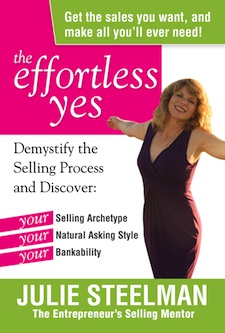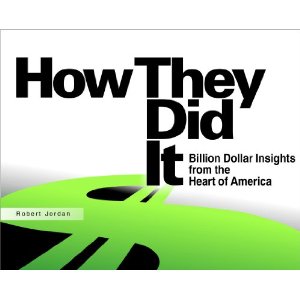Expert Advice From Female Entrepreneurs Part 1
Expert Advice From Female Entrepreneurs Part 1 “Women on Top-How to Get There”
Today I’d like to share with you excerpts from a webinar hosted by Amanda Gome, founder and publisher of the business E-newsletter Smart Company (www.smartcompany.com.au) 
Yes, I know the title it is a bit risqué and a tad misleading (sorry guys), but bear with me.
The content is vital even if you are a woman executive with no intention of starting your own company and becoming an entrepreneur.
Amanda invited 3 highly successful women entrepreneurs Diana Gribble, Gillian Franklin and Kristina Karlsson who also hold board positions to speak frankly about their experiences climbing the corporate ladder, give their views on the obstacles that stand in the way of women in their careers and how successful men do it right to get to the top.
Here are the first 3 tips on the subject of Vision:
TIP 1:
FOCUS ON THE END GAME
When I talk to women in their 20s and 30s and say to them how do you visualize what you want to be doing as a person when you’re 45 or 50, a lot of them say, oh I haven’t considered that. But to me, that’s imperative and then you work back and say: in order to be running this division in a big company, or having my own business or being a
CEO in a company, these are the skills I need to pick up along the way. So I think for women to be promoted, they need to be much more focused on the end game and then work back and say I need to do this along the way in order for me to get there. Diana Gribble
TIP 2:
DEVELOP YOUR VISION
Successful males in businesses spend very little time on reflection. They are always thinking forward and over the hill whereas women will be more inclined to reflect on what’s happening at the moment. I think developing the vision means clearing a space in your head to fill it with that vision. The vision is how you and your business can be completely different in three, or four or five or even just one year’s time. You have to think about what are the extra things, what are the opportunities.
You have to be looking towards and over the horizon all the time and have fantastic peripheral vision as well. Diana Gribble
TIP 3:
LEARN TO SELL THE VISION
Harvard Business Review research recently found that while women outshone men on most leadership dimensions, women fell short in one key area: developing strategy, a vision and selling that vision to stakeholders. Interestingly, that was the most prized skill that men value when assessing aspiring leaders. Women focus too much at just being great at their job. But they must look upwards at not just being good at their job but on developing strategy, vision and selling that upwards, to their board, or their bosses. Amanda Gome
My 2 cents worth: I think women are very detailed focused and terrific at multi tasking and managing the day to day running of a project/team/organization.
The big picture vista can be so blue sky that it doesn’t even enter her sphere of consciousness.
How does a woman counter this aspect that can blindside her career and ambitions.
I suggest taking time out during the work day, as busy and hectic as it may be and MEDITATE. I’ve said it once, I’ll say it again.
Meditation and quiet time to reflect and getting centered is the best thing a woman can do to get her focus back on track and be a timely reminder of why she is in the corporate world.
Women who are interested in advancing their career in business might consider looking into the St. Mary online MBA program.
More on this topic in the coming weeks.
Julie Steelman Interview: Sales is Not a Dirty Word
Julie Steelman knows a thing or two about selling; by choosing to see her sales role as one of giving overwhelming value and service to her clients it has made her debt free and allowed her to retire (at a very young age) to tropical Hawaii.
If you want proof, how about being able to generate $100 million in sales (this is not a typo) from clients such as Apple, Microsoft, Toyota, CBS Sony and Universal Pictures.
And this is when most people are struggling to make commissions and targets.
In her new book “The Effortless Yes: Get the Sales You Want and Make All You’ll Ever Need”, Julie shares her “a ha” moment after the very lean first two years in the business.
Her Road to Damascus moment can be summed up in one sentence, “It’s not about you, it is about the customer”.
Julie Steelman Interview (unlinked)
Julie’s advice: “Get over yourself because it is not personal; you’re here because you have something unique to give that can make someone’s life a lot better”.
Can’t argue with that kind of logic.
So if you have been finding the whole “selling” thing awkward, uncomfortable and downright icky (a technical term in the sales game), do yourself a favor and invest in Julie’s years of wisdom and practical know how-NOW!
Find Julie Steelman at:
http:// www.juliesteelman.com
Do You Have The Brains, Brawn and Mindset To Be An Entrepreneur: Carol Roth Interview
In these challenging financial times, President Obama is encouraging Americans to lift the economy and restore the stocks of this proud nation by reinventing themselves as the new wave of can do entrepreneurs.
Great if you are cut out for it and have the appetite for calculated risks, a bright idea and the stamina of a marathon runner, but what if you are not and don’t know that.
I suggest you listen to Carol Roth who has sage advice for would be tycoons too in lust with their million dollar idea but have not enough business sense to execute their plans.
Click here to listen Carol Roth Interview (unlinked)
She is an investment banker who used her business strategies to secure more than $1 billion for her clients and complete hundreds of millions of dollars in mergers and acquisitions.
Carol knows a thing or two about this subject and recently authored “The Entrepreneur Equation-Evaluating the Realities, Risks and Rewards of Having Your Own Business” a must read for anyone who is tempted to tell their boss to do the anatomically impossible, quit and assume they can create a fortune from their first business venture.
Carol uses her “Spinach In Your Teeth” method of communication that is both truthful and compassionate to let you know if you have the brains, brawn and mindset for the brief. As painful as it is, the uncomfortable fact for some is that being employed may be the best option for all concerned.
With refreshing candour, Carol encourages women entrepreneurs to acknowledge but not buy into the real or perceived gender divide in the world of big business. She tells with grace and good humour her own experience in this regard when she inadvertently found herself the recipient of the “Best Legs in the Business” award.
Get more information and no nonsense advice on www.CarolRoth.com
Jason Cunningham Interview: Where’s My Money?
Jason Cunningham is a thirty something boyishly good looking Certified Practicing Accountant with a sense of humor, and is the author of the financial self help book Where’s My Money.
Beneath the affable exterior is a person who at 13 witnessed first hand his parents’ efforts at recovering their financial standing after an unscrupulous business partner absconded with the cash. Jason states that the adversity he and his family faced shaped character and forged his entrepreneurial spirit.
As a founding partner in his highly successful accounting firm The Practice, he saw the all too familiar financial train wrecks of business and personal clients. An inability to consciously monitor their cash flow and expenditure for the financial year meant that Jason would invariably be faced with his clients’ plaintive and supplicatory pleas of “Where’s my money?”
In response he wrote Where’s My Money, aimed squarely at the financially illiterate who walk amongst us. Judging by the parlous state of most peoples’ bank accounts, it should cover approximately 90 % of the population.
In this interview, Jason describes how our personalities can greatly influence our desire to save, hoard or divest ourselves of our cash, in no particular order.
Jason Cunningham Interview (unlinked)
In addition to the safe and sure methods of long term wealth creation that includes investments in property, the share market or sound businesses he addresses the Gen Y expectation of instant gratification by throwing down the challenge that they provide more value if they want more money from their employers.
His concern that children are not taught the basic financial skills at school has him putting his money where his mouth is. Asked about his legacy, Jason replied, “In time to come I’ll sell the business, not have to worry about the money and become a primary school teacher”. Happy Days, Mr Cunningham
You can contact Jason at http://www.thepractice.com.au
Level 1, 200 Lygon St, Carlton Vic 3053 AUSTRALIA
Ph: +613 8888 4000; Fax: +613 8888 4099
Robert Jordan Interview: Six Success Tips for Aspiring Billionaires (How They Did It)
If you are like me, you too will wonder about what sets these seemingly ordinary people apart from the rest in terms of their capacity to recognize and identify a need, develop a service or a widget that addresses that need and then go on realize their goal of turning their ideas into millions of dollars.
I asked Robert Jordan who has compiled interviews with 45 billionaire entrepreneurs and published his book telling us how they did it. Below are six indispensable tips that helped them succeed. 
Click here to listen Robert Jordan Interview (unlinked)
Robert Jordan is an entrepreneur and author who has made it his mission to discover the “secret sauce” used by self made billionaires to launch themselves from growing an idea into $100 million dollar companies or if it suits, taking their pride and joy public to the tune of $300 million or more.
Robert’s entrée into their world is paved by his own success when he launched and grew his startup company, Online Access, the first Internet-coverage magazine that made it on the Inc. 500 list of fastest growing companies.
As is quintessential a characteristic of all serial entrepreneurs, he then sold his highly profitable Online Access and proceeded to start up a couple more companies, RedFlash, a project implementation team, and interimCEOinterimCFO, a worldwide network of interim, contract, and project executives.
Robert’s gift for getting consensus saw 21 of the eventual 45 founders agreeing to meet and freely share their insights, occasional pain and billion dollar experiences.
Their collective wisdom has been distilled into his latest book, How they did it: Billion Dollar Insights from the Heart of America. 
He freely admits this book was a labor of love, driven by an insatiable curiosity to know the minds and passions of this select group of diverse individuals.
All aspiring entrepreneurs who believe they are billionaires in the making will do well to heed the advice of the 45 who have gone before them. Here are just six tips to steer you to success:
1. Do not be afraid to fail; if and when you do, make sure you fail fast.
2. Do not be precious about your idea, be willing to tweak it
3. Leave your ego at the door; be astute enough to hire people smarter than you
4. However, make sure they are nice not just smart.
5. Honestly is still the best policy, so be on the level when communicating with the people who work for you because no one becomes a billionaire on their own.
6. Believe in the goodness of your angel investors but have Plans B, C and D just in case they decide to bail
Find Robert Jordan on http://www.HowTheyDidItBook.com
Dal LaMagna Interview: Failure Is Not Final
If you subscribe to self-development eNewsletters, round about this time of the year, (late January of 2011), your inbox will be inundated with a ton of emails with subject headings like “10 reasons why your new year’s resolutions have failed” and that is usually followed by an offer of “How we can help”.
If you have stuck with your resolution to improve your health, fitness, finances, and personal relationships then kudos to you.
Okay, so the title of this article may sound like one of those motivational, “Come on people, pick yourself up when you’re down” types.
Maybe it is, may be it isn’t. It all depends on your perspective.
Dal LaMagna Interview You can download the mp3 recording and pdf transcript of this interview by going to http://yourmoneyandyourmindset.com/online-store/
You see, we often make the mistake that successful people (millionaires) burst on to the scene as readymade straight out of the box (overnight) successes.
Some of these erroneous assumptions are engineered by the popular press because of the higher drama impact it has on the reader and hence circulation, and revenue (ooh, isn’t that cynical).
The reality is more boring, but nevertheless equally important.
It isn’t sexy to talk about the hard yards, sacrifices and sense of self belief and faith these people showed in the face of adversity.
Show me a person who claims to have just thought up an idea, implemented it and cashed in the millions of dollars without breaking into a sweat and I will show you Pinocchio.
So, I am going to throw you this idea. If you don’t fail, you will not know how to succeed. No, it’s not a mind bender, it actually occurs with predictable frequency.
I have made it my mission to ask self made millionaires how they arrived at their current situation.
Not a single millionaire has glossed over their multiple attempts before finally getting the right business plan, system or model to work well for them. Their candour and honesty is indeed refreshing.
Therefore, I would like to share with you the following interview with Mr Dal LaMagna, the founder of Tweezerman. He is actually a funny guy.
I have included a synopsis and titled the interview: How to fail your way to success
Dal LaMagna speaks honestly about his sixteen failed business ventures including turning down an offer from Coca Cola and saying no to being involved with the Woodstock Music Festival before he made his fortune from his company Tweezerman.
Tweezerman started as a one-man operation with seed capital of $500. By using head and heart business principles to grow his venture, he was able to walk away with millions when he sold it years later.
Dal shares his wisdom and insights on how to succeed as an entrepreneur in his new book Raising Eyebrows: A Failed Entrepreneur Finally Gets It Right (John Wiley & Sons).
He has done a huge favor to all the budding business tycoons out there by being up front and authentic when he tells it like it is which means you have to do the hard yards and own up to your mistakes, and that’s just for starters.
What more, the man shows that you can be a capitalist and have a social conscience.
I found Dal’s leadership style inspirational-there aren’t many CEOs who genuinely care and will take onboard every employee’s suggestion to grow a business.
Tweezerman flourished because Dal had the foresight to make each and every employee a partner in the business. Yes folks, they got a share of the revenue, not just a monthly pay check.
Do yourself a favor, get the book and read Dal’s many tips on how to succeed in business, and maybe just maybe you will not need to fail 16 times before hitting the mother lode.
Find him at his website:
http://www.dallamagna.com
Women Executives: Leadership Role Models (Part 4)
So, you have arrived at a position within your organisation that has some degree of autonomy and responsibility. In fact, you now lead a team of individuals, with unique talents.
Your boss has handed you a brief that requires your team to deliver on an important project on time and on budget. You know that it is the make or break opportunity and you really want to prove that you have what it takes.
This is your springboard to making it at the executive management level, your holy grail.
However, you also notice that you are going boldly to where no other woman has been, in fact your company is devoid of women executives. So, nada and zip in terms of finding a role model or a mentor in a skirt and killer heels. Bummer!
You are a modern woman (read resourceful, and confident), and you take it upon yourself to hire a career or executive coach to fast track your ambitions.
Any coach worth their salt will start with working out what makes you tick.
I am fond of quoting this line from Sun Tzu, “If you know neither the enemy nor yourself, you will succumb in every battle”–Art of War
In other words, if you want to achieve (and earn) more, you have to become more.
You cannot expect to operate on a higher level without first making the necessary changes in the way you think, behave and conduct yourself. If you are expecting circumstances to adapt to suit you (as you are now), you are going to be waiting a very long time to become successful.
Have you given some serious though about what it means to be a well respected and effective leader?
In your present role where you work for your immediate boss, ask yourself what is it that you admire about him/her. Conversely what do not like very much about the way they run their unit or department especially in their daily interaction with their team.
List what you consider as the traits of your ideal leader, a person that you’d happily become. What are the interpersonal skills that you would like that person to possess?
Remember, to be an effective leader means getting your team to carry out a piece of work to a standard and level above what they would normally deliver. More importantly, it is getting them to do this willingly without cajoling or the threat of unemployment!
Bottom line: It means being influential and having your people opt in to your vision and goals.
I shall leave you to ponder this for the time being.
Yours in health, wealth and happiness
Endometriosis and the Career Driven Women
Below is an article by Melissa Meyer of www.cureendometriosis.com
Melissa has written a personal blog about endometriosis and her own research and discovery on healing.
I am sure most women can relate, so if you are interested in finding out more, drop by Melissa’s site for a read.
Endometriosis affects 1 in 7 women around the world and this number is sadly on a steady increase. The condition affects women of all ages and many women only discover they have the condition once they slow down and wish to conceive a child. It affects a woman’s fertility and this can be the very first obvious symptom.
Endometriosis is formed when retrograde cells are found within the uterus that grow and form adhesions. It is these cells that can cause damage to fallopian tubes and ovaries and thereby inhibit pregnancy.
As the condition is more prevalent in women in their late 20’s it is often associated as a “career women’s disease”.
Women who have endometriosis seem to possess personality traits which fall into strong, driven and perfectionism traits, which has created the link between the “career women’s disease” and endometriosis.
Though these traits appear on the surface to reflect a determined and confident personality, the driving force behind these traits needs to be carefully reassessed. Many women with endometriosis actually suffer from a constant need to be better than who they currently are.
They are driven to constantly improve who they are and be more than what they can be. Although this trait can be positive in certain individuals, too much of this drive can create unnecessary physical and emotional stress.
The motives for being more and driving oneself further often relate to a poor self-image or a need to be perfect. Endometriosis has been closely linked to a thought pattern referred to as “Timeous Perfectionism”.
Essentially the drive is to do a job perfectly and quickly at the same time. It is this constant pressure to perform and do more, in a shorter space of time at the highest standard that ultimately creates an incredible stress inside of the body. Endometriosis sufferers have been recognized to possess this thinking pattern and the connection between time and perfectionism is even more prevalent in certain job roles.
It is also this perfectionism that is unfulfilling and never ending. Achievements are not valued within themselves and they are constantly seeking more. They are often self critical and unrewarding towards their own achievements and seek approval from others.
It is important to acknowledge and accept these traits within oneself early so we can recognize them when we think and act on them and learn to slow down and recognize the emotion attached to the stress event. The more we can recognize our repeated traits, the easier our healing process will be.
Happiness begins when one can accept oneself and love oneself regardless of achievements. Acknowledgement for what one has achieved is also a very important step and would also provide additional self-esteem. We seldom give ourselves true reward for the things we have achieved in life.
It is only through acknowledgement and self love that true healing and happiness and really occur.
Women Executives: Leadership Role Models (Part 3)
If my 2 previous posts have seemed less than optimistic, let me assure you that there is hope (for us all!).
Below is an article by Professor Ginka Toegel the Director of Strategies for Leadership Program, International Institute of Management Development, Switzerland.
Companies are not setting themselves these targets out of some generalized notion of equality but because there is a strong business case for them to do so.
There has been a great deal of research in this area that suggests the value of having gender diverse management teams.
For example, companies that have more than three women in management positions tend to have better return on equity and assets than do those with fewer women.
They also tend to score higher on organizational effectiveness criteria. Equally, women board members tend to be very well-prepared for meetings, which raises the benchmark for others.
This subsequently leads to better discussions, and better decisions.
So, there is a clear business case for companies hiring and promoting more senior women. But what is life like for the women who are already in these roles?
When we have less than 15 percent of a minority in a social category, we talk about tokens.
And anyone who is in that position is likely to be under a huge amount of pressure, as they are highly visible, and frequently will feel that they represent not just themselves, but their entire category.
At 25 percent – in many companies this is currently the target – they are still in a minority, but they are no longer tokens.
The tipping point is 35 percent: once we reach this level, visibility becomes less of an issue and women’s identity as women becomes less salient.
Past this point, when women speak, they are heard as individuals with their own separate backgrounds, values and personalities, not as “the woman”.
Her opinions and views are not reduced to her gender.
The problem at the moment is that we have so few senior women in management positions that they are perceived as outsiders.
This creates a kind of legitimacy gap, in that they do not fit the (male) stereotype of what it is to be a leader.
This leads in turn to another problem, which is that male leaders tend to be associated with “agentic” behavior: they are more likely to be proactive, assertive, dominant, in control of the situation.
Female leaders, by contrast, show what we call “communal values”: friendliness, support, warmth and a caring attitude.
When we look at these two sets of values, it becomes clear that it is the agentic approach that we associate with leadership.
Many women come to the conclusion that, as a result of these stereotypes, the only way for them to be perceived to be legitimate leaders is to emulate male leaders.
However, the real answer is not so straightforward.
If women simply emulate men, they violate the gender stereotype, which creates a perception that they are being phony.
This creates a real problem, and can lead to them being penalized for being inauthentic leaders.
Women should instead blend both sets of characteristics.
Indra Nooyi, the Chief Executive and Chairwoman of PepsiCo, does this very successfully; she can make tough decisions and is very assertive in negotiations, but her direct reports also describe her as extremely warm and caring.
What then of the future? Well, despite the disappointing statistics there are many good reasons to be positive.
The next 5 to 10 years will see a dramatic change for the better.
Women managers can contribute to this by understanding that there are certain expectations related to organizational leadership, and developing their skills accordingly.



